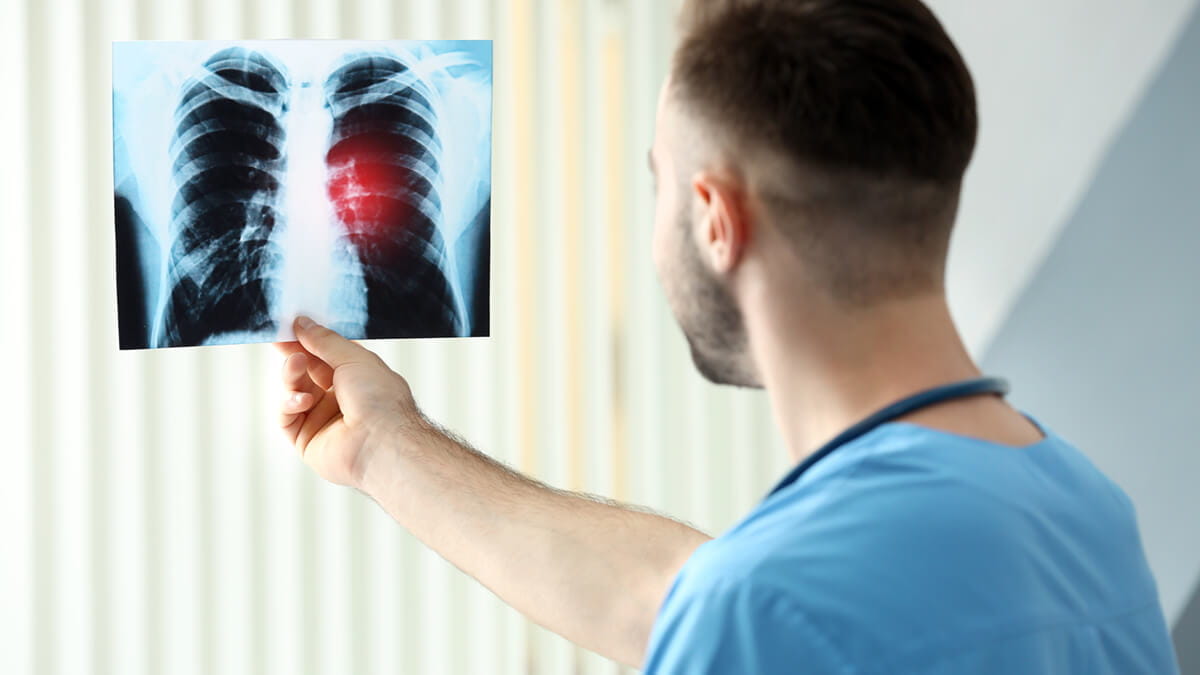November is Lung Cancer Awareness Month, a time to educate the public about what lung cancer is—and how to prevent it—through an intensive public service campaign. It’s just one example of the life-saving public service health programs developed by public health professionals to promote health and wellness in communities across the U.S.
What Is Lung Cancer?
Lung cancer develops in the lungs when a cluster of abnormal, malignant cells form a tumor. Lung cancer is the second most common cancer, but is the leading cause of cancer deaths in men and women worldwide. It typically occurs in people over the age of 65, with fewer than 2% of lung cancer cases occurring in women and men under the age of 45.1
Here are seven facts you may not know about lung cancer:
- It’s the leading cause of cancer deaths in the U.S. Lung cancer accounts for about 25% of all cancer deaths and is by far the leading cause of cancer death among both men and women. Lung cancer estimates for 2018 are:2
- 234,030 new cases of lung cancer (121,680 in men and 112,350 in women).
- 154,050 deaths (83,550 in men and 70,500 in women).
- Nonsmokers get lung cancer. Although smoking is what causes the majority of lung cancer instances, about 30,000 people die every year from lung cancer despite never having smoked. The leading causes are:3
- Secondhand smoke—About 3,400 nonsmokers die of lung cancer because of long-term exposure to secondhand smoke.
- Radon gas—About 20,000 deaths from lung cancer are caused by this odorless and invisible gas that naturally occurs in small amounts that are harmless outdoors. However, radon gas can be deadly if you unknowingly live in a house built on soil containing natural uranium deposits. A special radon gas test can determine if this deadly gas is endangering your family.
- Workplace toxins—Unfortunately, not everyone works in a safe environment. Workers are still being exposed to asbestos, arsenic, and other cancer-causing agents, though these incidents have declined in recent years.
- Air pollution—Today’s high pollution levels, particularly in large industrial cities, contribute to lung cancer, especially in those already exposed to other causes of lung cancer.
- There are four stages of lung cancer. In what is known as stage one, the cancer is confined to the lung. In the second and third stages, the cancer has spread to the lymph nodes. By the fourth stage, the cancer has spread (metastasized) to other areas of the body and is extremely difficult to treat.
- Lung cancer is often diagnosed too late. Unlike breast and colon cancers, there is no early detection screening test for lung cancer because there are seldom early signs present. This is why taking preventative measures wherever and whenever possible is so vital to your health.
- Scientists have developed safer, more effective treatments. Researchers are steadily finding new breakthroughs in successfully treating lung cancer. For example, genetic tests help doctors prescribe targeted treatments for different types of lung cancers, and immunotherapy is an emerging lung cancer treatment.5
- Lung cancer is not always deadly. If you’ve been diagnosed with lung cancer, there’s still hope. More than 430,000 people are alive today thanks to effective treatment.2
- Lung cancer prevention strategy. Since smoking causes more than 80% of all cases, quitting smoking (or never starting) is what’s best for lung cancer prevention. The Lung Cancer Alliance also recommends screening for those at risk. Additional measures include:5
- Limiting exposure to secondhand smoke—including the clothing of those who’ve been smoking in other areas.
- Having your home tested for radon—it’s a simple process, and mitigation systems are easily installed and cost-effective.
- Avoiding workplace carcinogens by following employer-recommended precautions, like wearing a face mask at all times. And if you’re concerned about a potential hazard, ask your safety officer or other appropriate personnel.
- Eating a healthy diet helps with cancer prevention in general, and may help reduce the risks you can’t control, including pollution levels in your area.
If you feel passionately about the value of public health programs and protecting the public from dangers, you should consider pursuing a public health degree, which can prepare you for a rewarding and challenging career as a public health professional. Walden University, an accredited institution, provides a suite of online public health degree programs including BS in Public Health, Master of Public Health (MPH), PhD in Public Health, and Doctor of Public Health (DrPH).
Explore Walden University's online public health degree programs and specialized certification programs for undergraduates and graduates. Earn a degree that fits your career goals in a convenient online format that fits your busy life.
1Source: www.cancer.org/cancer/lungcancer-non-smallcell/detailedguide/non-small-cell-lung-cancer-key-statistics
2Source: https://www.cancer.org/research/cancer-facts-statistics/all-cancer-facts-figures/cancer-facts-figures-2018.html
3Source: www.cancer.org/cancer/news/why-lung-cancer-strikes-nonsmokers
4Source: www.cancercare.org/publications/18-treatment_update_lung_cancer
5 Source: http://www.lungcanceralliance.org/am-i-at-risk/what-do-i-need-to-know-about-risk/should-i-be-screened-for-lung-cancer.html.
Walden University is accredited by The Higher Learning Commission, www.hlcommission.org.




